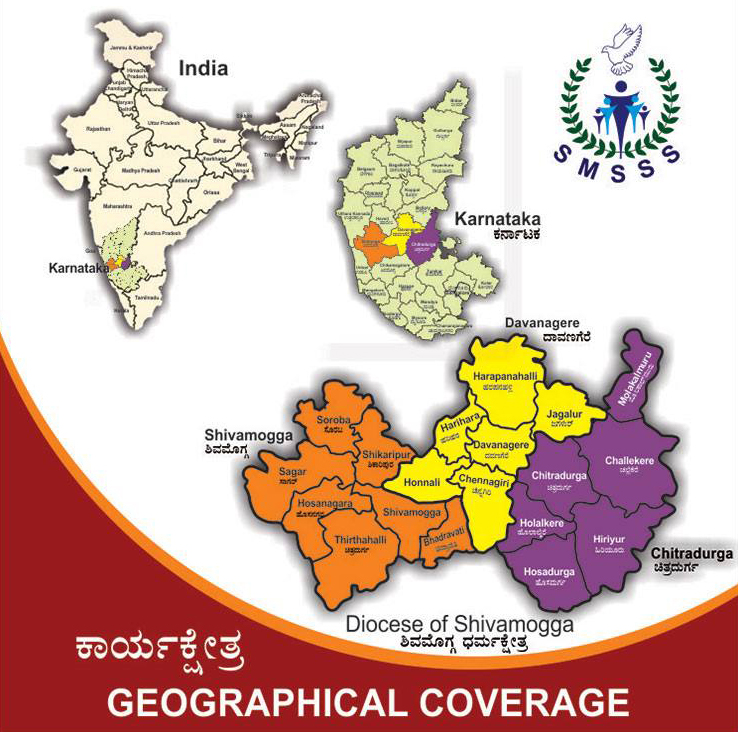The Shimoga Multipurpose Social Service Society (SMSSS) is the 'Development arm' of the Diocese of Shimoga, Karnataka, India which comprises of three civil districts namely, Shivamogga, Davanagere and Chitradurga.
SMSSS is a secular, voluntary, non-profitable organization registered under Karnataka Societies Registration Act-1960, Foreign Contribution (Regulation) Act-1976 and Income Tax Act under Section 12A and 80G.
SMSSS is committed to influence positive change in the lives of the people of the Diocese ever since it came into existence in 1989.
It caters to the needs of the poor & marginalized of the Diocese irrespective of caste, creed, gender and race through developmental interventions in more them 627 villages of 187 Grama Panchayaths of three districts.
VISION: The establishment of a Society based on Justice, Peace and Love.
MISSION: Empowering the poor and the marginalized through the process of capacity building and rights based actions.
GOAL: Marginalized communities will have access and control over knowledge, resources and decision making for their integral and sustainable development.
SMSSS IMPLEMETS THE DEVELOPMENT PROGRAMMES UNDER 6 DEPARTMENTS
1. Women Empowerment
2. Education and Development
3. Natural Resource Management
4. Good Governance
5. Health & Development
6. Capacity Building
1. Women Empowerment:
Goal:Women will have gained more equal access and control over information and knowledge, resources, decision making in family and community affairs.
Programmes:
1. Women Empowerment Projects.
2. Streebandhu Multipurpose Souharda Cooperative (Women’s Bank).
3. Women in Micro-Eterprises.
4. Women Rights.
5. Family Development Programme.
2. Education and Development:
Goal: Communities, particularly children, will have improved their levels of education and development in keeping with their potential and will be able to use it for the social and economic development of their communities.
Programmes:
1. Integrated Child Development Programme (ICDP).
2. Child Rights.
3. Unnati- Shcolarship for Higher Education.
4. Karanataka Open School (KOS).
5. National Institute of Open School (NIOS).
6. Disha – Career Advancement Programme (CAP).
3. Natural Resource Management:
Goal: Communities will have been utilizing available natural resources (land, water and forest) for their needs and well being in an optimum yet sustainable manner.
Programmes:
1. Farmers’ organization and livelihood of small and marginal farmers.
2. Farmers’ rights.
3. Soil and water conservation.
4. Organic Farming.
5. Effective and sustainable use of Alternative sources of energy.
4. Good Governance:
Goal: Marginalized communities will have greater participation in the process of governance and effectively influence the governance structures in their favour, AND those in leadership positions will be more sensitive, capable, accountable and transparent.
Programmes:
1. Empowerment of civil society towards promotion of good governance.
2. Promotion of value based and efficient leaders.
3. Creation of model grama panchayaths.
4. Mass awareness on PRI, RTI, MGNREGA, PDS and Government Schemes.
5. Health and Development:
Goal: Communities will be using means to protect themselves from communicable diseases, particularly HIV/AIDS and PLHIVs live a life of dignity and inclusion.
Programmes:
1. Prevention of HIV/AIDS and stigma reduction.
2. Support services to PLHIVs.
3. Mass awareness on communicable diseases and prevention.
4. Village health camps.
6. Capacity Building:
Goal: Various stakeholders have been capacitated to be able to reflect, make decisions and implement the learning and decisions for improved results in their areas of work.
Programmes:
1. Capacity Building of the change agents (NGO, GO, CBO)
2. Seminars and Workshops.
3. Designing and conducting innovative and relevant training programs.
4. Publications.





